In which the beleaguered reviewer attempts to make some headway into the mounds of CDs seeking reviews accumulating daily by providing quick hits on a few recordings at a time.
Ernest Dawkins New Horizons Ensemble - "The Prairie Prophet"
 (Delmark)
(Delmark)
On an album dedicated to the late Fred Anderson - whose nickname was the Prairie Prophet, Khabeer Ernest Dawkins leads his New Horizons Ensemble through seven superb original compositions infused with the spirit of the talented and generous Anderson. The songs themselves were developed and rehearsed in Anderson's much-missed Velvet Lounge, while the musicians themselves all honed their chops in Baaba Fred's workshop. These fine young players include young trumpeters Marquis Hill and Shaun Johnson, veteran trombonist Steve Berry, guitarist Jeff Parker, bassist Junius Paul and drummer Isaiah Spencer. As befitting Anderson's interest in a wide range of styles from traditional to avant garde, Dawkins starts things off with a lovely uptempo waltzing number "Hymn for a Hip King," which offers some fine solos by Hill, Johnson and Dawkins himself, as well as some excellent support from Parker, Paul and Spencer. This is followed by the avant garde directions of "Sketches" with Dawkins and crew creating music out of thin air in a similar manner to how Anderson used to do this in his free form late night jam sessions at the now shuttered Velvet club. After a jangly opening theme his song takes several different directions, all enjoyable: halfway through, the band snaps into place in a swinging motion suddenly out of chaos, complete with whoops and Paul's walking bass, before morphing yet again into free form fun culminating in Paul's percussive bass solo, uncredited harmonica and bluesy vocals. "Balladesque" shows the composer's ability to write a beautiful and almost too-brief horn charts, while "Mal-Lester" is a swinging tribute to fallen AACM heroes Malachai Favors Maghostut and Lester Bowie. The latter is a true centerpiece number with solid bass and drum work, as well as Parker's brilliant guitar comping, and featuring great solos by Johnson, Berry, Dawkins, Paul and Parker. "Shades of the Prairie Prophet" is an 11:08 track with considerable freedom for all the members to stretch out on, while Dawkins' fiery solo sounds like Anderson was still on stage. Berry brings his original "Mesopotamia" to the project and this moody number is a nice change up, utilizing plenty of space and a vaguely Middle-Eastern feel. Meanwhile, the album ending "Baghdad Boogie" is a throwback to the protest music of half a century ago, with modern twists and a spoken word interlude decrying a mankind bent on destruction of their their fellow man. "No more war" indeed. A thought-provoking and enjoyable outing from an exciting composer and ensemble.
Ernest Dawkins New Horizon Ensemble "The Prairie Prophet" CD Release will take place on Thursday March 31 at Andy's
www.delmark.com
 Delfeayo Marsalis - "Sweet Thunder"
Delfeayo Marsalis - "Sweet Thunder"
(Troubador Jass Records)
In 1957, Duke Ellington and Billy Strayhorn were inspired by the Stratford (Ontario) Shakespeare Festival to compose a suite of music based on the plays and characters of the great playwright.that they called Such Sweet Thunder (after a line from A Midsummer's Night Dream). Fast foreward a half a century and trombonist/composer/producer AND former master's literature student Delfeayo Marsalis discovers Duke's original scores in the Smithsonian Institute. Taking the original scores as impetus, Marsalis refashioned the big band arrangements for an octet, rearranged the order and added exposition, changed instrumentation, and took the songs in a different, and somewhat modernized direction, without losing the original flavor or intent. On the modern take, Delfeayo is backed by an incredible group of musicians, including: brother Branford, Victor Goines, Mark Goss and Jason Marshall on saxes; brother Jason and Winard Harper on drums; pianists Mulgrew Miller and Victor "Red" Atkins; trumpeter Tiger Okoshi; and Reginald Veal, Charnett Moffett and Davis Pulphus on bass. Ellington took on some of Shakespeare's most famous creations including Henry V ("Sonnet to Hank Cinq"), Othello ("Sonnet in Search of a Moor") , Julius Caesar ("Sonnet for Caesar"), Romeo and Juliet ("Star Crossed Lovers"), Lady MacBeth ("Lady Mac"), Cleopatra ("Half the Fun") and Hamlet ("Madness in Great Ones"). On his musical sonnets, Ellington used a variation on Shakespeare's sonnet forms - using 10 notes for 14 lines, while Marsalis takes it further and inserts a solo section where there is a break (volta) in traditional sonnet form after the 8th line. Also, like Ellington, Marsalis uses his soloists in a similar manner - utilizing Okoshi's trumpet and Branford's soprano sax in place of original soloists Johnny Hodges, Paul Gonsalves and Clark Terry.
The bluesy "Such Sweet Thunder" opens things up in enjoyably swinging fashion with Branford and Delfeayo bringing the Bard to Bourbon Street with their solos. On "Sonnet for Sister Kate, " Delfeayo replaces the piano intro with Jason Marshall's bass clarinet, while his talking muted trombone reflects over Jason's African drumming. The trombone and saxes have some hot fun on the humorous, but challenging "Sonnet to Hank Cinq (pronounced ironically as "sank"), while the Queen of the Nile is exotic and sexy on the mysterious "Half the Fun" - with Branford playing the part of the asp. Goines is called upon to portray the mischievous Puck on "Up & Down, Up & Down," as well as the hero who is going insane on "Madness in Great Ones." On the latter, the other horns attempt to keep Goines from going insane to no avail. "Star Crossed Lovers" is a beautiful Strayhorn ballad with luscious work from the tromboniast. alto saxophonist Gross and pianist Miller, while "Sonnet in Search of a Moor" is highlighted by blazing solos by Goines on tenor sax and Red Atkins on piano over Jason Marsalis' relentless drumming.The soft-shoe "The Telecasters" and somber "Sonnet for Caesar" also combine great playing with delicious harmonies and "Lady Mac""is a jazz waltz with a touch of gospel. The burner "Circle of Fourths" uses four keys to refer to Shakespeare's greatness in "tragedy, comedy, history and sonnets," but is primarily a chance to solo over fast chord changes. With this release, Delfeayo Marsalis has taken a beloved, yet perhaps overlooked work and added to it with great care and respect in reinventing a classic into a modern classic.
Delfeayo has postponed his Chicago appearance with Sweet Thunder originally scheduled for April 8-9. We will keep you informed as to when he will reschedule.
www.dmarsalis.com/
Soren Moller - "Christian X Variations"
 (Audial Records)
(Audial Records)
On the Christian X Variations - recorded live in concert, Danish pianist Soren Moller surrounds two quartet pieces with three that add the Kirin Winds ensemble in a suite of music dedicated to King Christian X of Denmark whose defiance in the face of the Nazi occupiers in WWII and attempts to save Danish Jews are still an inspiration. The opening Nonet I, is a shimmering number that is well suited to Moller's goal of celebrating the spirit of humanity in the face of discrimination and mistreatment. Moller's highly melodic piano is aided by the breathy interjections of the Kiran Winds, the muscular drumming of Henry Cole and the soaring soprano sax of his collaborator Dick Oatts (these two recorded one of our top-ten albums of last year - The Clouds Above - see here) on a bright, buoyant composition that is among the most rewarding I've heard so far this year. On "Kvartet I," the quartet (bassist Josh Ginsburg rounds out this combo), the music gets darker, more angular and troubling. Moller takes a tough solo, and Oatts replies on tenor. Moller's classically-tinged waves of piano arpeggios provide the framework for the regal and pensive "Nonet II," with the winds in a goregeous somewhat traditional wind ensemble role. Ginsburg takes a fine solo here, followed by Moller and Oatts back on skittering soprano, on a superb composition that builds strongly to a climax. "Kvartet II" is the jazziest number of the outing and shows the quartet at their hard-swingingest. Moller hits the keys hard with a McCoy Tyner feel and Oatt's wails with joyful abandon on this classic jazz-sounding track. The modern bend of the ending "Nonet III" features Moller's strong left hand and unusual piano polyrhythms, Oatts shredding, Moller cartwheeling, the rhythm section locked-in and charging ahead, while the winds bring in washes of color. Truly a reamrakble achievement, but one I knew Moller was capable of, based on his fine solo work and work with the imaginative NYNDK group. A must have 2011 release.
www.sorenmoller.com/
 Fred Hersch - "Alone at the Vanguard"
Fred Hersch - "Alone at the Vanguard"
(Palmetto Records)
One of the preeminent jazz pianists of the current age, Fred Hersch returns to the site of his greatest triumphs to record this stellar solo album. In 2005, Hersch was the first solo pianist to play a week-long engagement at New York's legendary Village Vanguard, and the club also was the venue for his return concert after he emerged from a two-month long coma in 2009. Rather than presenting a greatest hits recording from the week, Hersch decided to offer the final set from the last evening of the week in its entirety. Hersch starts off with a beautiful version of "In the Wee Small Hours of the Morning" that shows he is playing as lyrically as ever, before striding into the original "Down Home." Dedicated to his recording partner (1999's Songs We Know) - guitarist Bill Frisell, this gospel-flavored celebration of old-school stride piano shows Hersch's talents in another and somewhat unexpected style. The pianist continues with three more original compositions. The lushly elegant "Echoes" is a fabulous display of Hersch's masterful abilities and is perhaps the highlight of the album. "Lee's Dream" is based on "You Stepped out of a Dream" and dedicated to the great alto sax pioneer Lee Konitz, with the pianist recreating Konitz style lines on the piano. Meanwhile, the lovely "Pastorale" is dedicated to the classical composer Robert Schumann, whose work I suspect many jazz pianists discovered early in their career, and whose influence has been showing up with more frequency in jazz of late. Hersch has always been open to a wide range of music and Brazilian music is no exception - here he takes on Jacob do Bandolim's choro for mandolin "Doce de Coco" with pleasing results. Eubie Blake's "Memories of You" is toned down from its ragtime roots and turned into a ballad of great depth and beauty in Hersch's hands. Of course, some Monk is on the bill, but here it is the lesser known "Work" that is the artist's choice. A clear influence on his own style, Hersch revels in Monk's idiosyncratic twists and turns, capering across the keys with energy and joy. Hersch's choice for the encore is Sonny Rollins' blusey "Doxy," although he takes his time getting to the recognizable theme, choosing to meander his way down many pathways that come to mind. However, like the album as a whole, the journey there is well worth the time.
www.fredhersh.com
Thomas Marriott - "Constraints & Liberations"
 (Origin Records)
(Origin Records)
Seattle-based Thomas Marriott has become one of the best young trumpeters around, as well as one of the busiest. The past couple years have seen Marriott recording with the late Hadley Caliman, superstar trumpeter Ray Vega and releasing this fantastic album with pianist Gary Versace, tenor saxophonist Hans Teuber, bassist Jeff Johnson and drummer John Bishop - the first to feature all original compositions by Marriott (and one from Johnson). A second new release from the busy trumpeter - this time with Versace on B-3 organ - has just arrived in my mailbox and I hope to get a chance to hear it very soon, as this recording leads me to believe it will be superb as well. Constraints and Liberations takes its title from a period in Marriott's life when he was newly married and became a father and was questioning his future in music. Almost in answer to the question, Marriott's playing took on a newfound maturity on this record and the results of this balance between responsibility and freedom seem to say clearly that the young man has a great future ahead of him. Opening number "Diagram" is as strong an opening as you will hear - with Marriott and Teuber trading exciting improvised lines overa roaring rhythm section with an impressive combination of swing and free form. "Up from Under" is a glimmering ballad built over one chord, with long, breathy lines from Marriott, taut response from Teubel, rumbling bass and drums and incredible improvised piano cascades by Versace. The magical band interplay continues on the title track with its unison horn lines and loose, yet grooving middle section with some of Johnson and Bishop best work. This is some stellar work that should please most listeners. The dreamy "Walking Dream," mid-tempo "Early Riser," Johnson-penned "Clues" and album-ending "Treadstone" operate with a lot of open spaces and excellent playing and group interaction, but to my mind, do not quite match the interest and excitement level of the first three numbers, but are quite satisfying nonetheless. Fine job - can't wait to hear his next one.
www.thomasmarriott.net
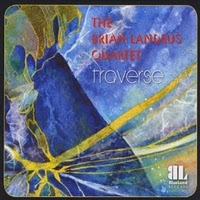 The Brian Landrus Quartet - "Traverse"
The Brian Landrus Quartet - "Traverse"
(Blue Land Records)
Last year, we were treated to an impressive debut from young reed player/composer Brian Landrus (see our review ) that we felt announced an important new voice on the jazz horizon. Forming his own label (Blueland Records), Landrus announce the release of two new recordings for 2011, the first of which is Traverse, recorded with an exceptional band: drummer Billy Hart, pianist Michael Cain and bassist Lonnie Plaxico. Landrus - who by the way is primarily a baritone sax/bass clarinet specialist is committed to keeping the low end of the spectrum important in way that perhaps hasn't been attended to with such care since the late, great Gerry Mulligan. Not that Landrus is imitative of Mulligan, but his voice does share the same reverence for tradition and willingness to stretch boundaries that the cool jazz pioneer brought to bear. Landrus' compositions dominate the recording and he has found a successful partnership with Cain - who cowrites three of the numbers, including the opening one-two punch of "Traverse" and "Gnosis" that set the stage for an album of exciting and mature songs. The lovely piano/bari sax duet of "Lone" is a shimmering highlight, while "Lydian 4" references George Russell's Lydian Chromatic Concept of Tonal Organization, while giving the band the opportunity to spread their wings. The old master Hart shines here and throughout - it is time this veteran player is given the due he deserves. The old standard "Body and Soul" is the only cover song here, but it also serves as the inspiration for Landrus' solo improvisation cheekily titled "Soul and Body." The blusey 10:02 "Creeper" was also co-written with Cain, and features fine solos by all, including one of Landrus' best offerings, as well as a satisfying outburst from Hart. An extremely short ballad "Soundwave" ends the album on a somewhat dark and contemplative note that will have you longing to hear more from this talented rising star. Fortunately, the Reno, Nevada-born, Brooklyn-based, Landrus has another release scheduled for July - this time with his Kaleidoscope group.
www.brianlandrus.com
Wayne Wallace Latin Jazz Quintet - "To Hear From There"
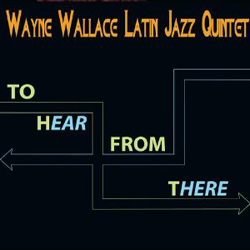 (Patois Records)
(Patois Records)
The hard working West Coast Afro-Cuban trombonist/composer/bandleader Wayne Wallace returns with the follow up to his 2010 Grammy-nominated Bien Bien (see our review ). Wallace's same core quintet is back: pianist Murray Low, bassist David Belove, percussionist Michael Spiro and drummer Paul van Wageningen - and these musicians are among the finest working in the genre today. Wallace starts things off by paying tribute to the National School of the Arts in Havana, Cuba where he studied on the energetic "La Escuela," which listeners will have trouble keeping their feet still on. Wallace takes the lead, and Belove takes a chewy solo, while the percussion bed churns along like a freight train. Meanwhile, it is a trombone extravaganza on "Saerafina Del Caribe" as guest bone players Jeff Cressman, Dave Martell and Natalie Cressman join Wallace for a surfeit of trombones. Kenny Washington adds his vocals to a pleasing version of "Perdido," while the cha-cha-cha "Los Gatos" is a true highlight with a slinky melody, sing-along-lyrics and great band interplay. The band's comfort level with each other is shown fully on "Desacrga En Blue" - a fun jam piece. The band covers Gilberto Valdes' folk lullaby "Ogguere (Soul of the Earth)" as an Afro Latin 6/8 groover, while paying tribute to perhaps the greatest trombonist in jazz - J.J. Johnson on his famous "Lament" with Wallace caressing this beautiful melody. Based on the cries of street vendors, "The Peanut Vendor (El Manicero)" was the first million-selling Cuban pop song in the U.S. Vocalist Bobi Cespedes sings this song with such feeling that you get the idea that it may be a hit again. The lovely and danceable "Yemana the Seven Seas" alternates between 7/4 and 4/4 and shows Wallace's compositional creativity, while "Bebo Ya Llego" is a shout out to the father of modern Cuban music Bebo Valdes. A truly fun arrangement of Tito Puente's "Philadelphia Mambo" appropriately closes out this recording. Fans of well played Afro-Cuban music will surely enjoy this solid and entertaining release from one of the leaders of the modern Afro Cuban scene.
www.patoisrecords.com
 Edward Mendenhall - "Cosine Meets Tangent"
Edward Mendenhall - "Cosine Meets Tangent"
(Miles High Records)
West Coast pianist Eddie Mendenhal makes his debut as a leader on a record on Cosine Meets Tangent. Don't be alarmed by the title; this isn't one of those pedantic math-based recordings, but instead offers a selection of warm and engaging originals. Mendenhal is a Berklee graduate relocated to Monterey, Calif. (by way of a 7-year stint in Japan) - where he is the director of the Monterey Penninsula College jazz department, leader of his own trio and a member of Ray Brown's Big Band. On this release, Mendenhall is joined by fellow Ray Brown member bassist John Schifflett, energetic and inventive drummer Akira Tana (co leader of the TanaReid quartet with Rufus Reid), and world-renowned vibraphonist Mark Sherman. This session was recorded in one day with no rehearsal, but although the music retains its freshness, the ambitious arrangements are performed with considerable cohesion. From the opening drum pattern on "Protocol," the band comes out swinging hard, but with grace and melody intact. Sherman gets the first solo and shows why he was a multiple Downbeat Rising Star award winner who is in demand around the world, before Mendenhall takes a solo turn that reveals his influences such as Art Tatum. Hank Jones and Bill Evans in his confident style. Schiflett deserves credit for keeping the music on track as Tana is a drummer whose lines spill and shift around the rhythm. Not that this is a problem, in fact it adds to the excitement of the recording. "Spring Waltz" fits its name well and Schifflett adds a solid solo, while "Rain Hike" continues the gentle but bouncy atmosphere with a touch of Latin flavor and great solos by Mendenhall and Sherman. "Blues for Yokohama" is relatively uptempo and jagged piece that also features Tana on a cracking solo. Sherman suggested covering the standard "So Easy to Remember" and it is a good choice for this configuration, while "Rin Ki Ou Hen" mines a bit of a similar vein as the earlier blues, with long angular unison lines breaking up te swing nicely and Tana and Schifflett propelling the music along nicely for their soloists. "Lament for the Ocean" is a pensive but hopeful trio number referring to the Gulf in the aftermath of the 2010 oil spill, while Sherman's "The Great Triplet" is another strongly swinging composition. A lovely short tone poem "Morning Stretch" and the jittery title track (another trio piece) end this agreeable album, but it is good to hear that because this initial recording went so well, the parties involved are busily writing material for the follow up - something we will look forward to while enjoying the present record in the interim.
www.eddiemendenhall.com
Pascalito - "Neostalgia"
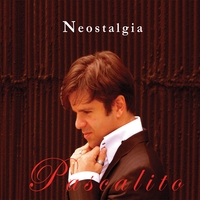 French-born, NYC-based singer/Wall Street banker Pascalito offers a wide range of styles on his Neostalgia. Opening track "Tango de Non Retour" is a highly polished dance track, while "Solestalgia" is an update on the type of song crooner Charles Azvanour is famous for - highlighted by some pleasing violin by Sarina Suno. The singer takes on the Eurhymics' "Here Comes the Rain Again" and turns it into a seductive slow Mediterrean cruise with lovely nylon-string guitar by Keiji Yoshino. Pascalito himself has a pleasant voice that recalls Azvanour and Caetano Veloso with a hint of Chet Baker. He duets nicely in French with smoky-voiced Jessica Medina on "La Pluie sr ta Peau," while the jaunty, gypsy-jazz "Le Blues De La Fleuriste" and moody, tango-esque "La Cirouille De La Toussaint" bring more than a bit of the Old World to NYC, his adopted city, which is paid offhand tribute to on the tasty "Bossa Nova City." "Motsicien Bleau (Tribute to Claude Nougaro)" is a heartfelt nod to another influnece - the late, great French chanson singer who is unfortunately relatively unknown here in the states. Nougaro combined French balladry with North American jazz and South American influences, and it is clear that this is a successful merger of styles that Pacalito himself seeks to continue exploring. Stan Killian's flute enhances the version of "Boulevard of Broken Dreams," while well-known percussionist Rogerio Boccato's array of sounds is a welcome presence throughout. Pascalito also covers the aforementioned Veloso on""Soleil d'Or" and ends the album with the entrancing "Love Theme from Spartacus." A mostly relaxed and successful bridging of Mediterranean and Latin musical cultures that is the perfect cure for the winter blahs.
French-born, NYC-based singer/Wall Street banker Pascalito offers a wide range of styles on his Neostalgia. Opening track "Tango de Non Retour" is a highly polished dance track, while "Solestalgia" is an update on the type of song crooner Charles Azvanour is famous for - highlighted by some pleasing violin by Sarina Suno. The singer takes on the Eurhymics' "Here Comes the Rain Again" and turns it into a seductive slow Mediterrean cruise with lovely nylon-string guitar by Keiji Yoshino. Pascalito himself has a pleasant voice that recalls Azvanour and Caetano Veloso with a hint of Chet Baker. He duets nicely in French with smoky-voiced Jessica Medina on "La Pluie sr ta Peau," while the jaunty, gypsy-jazz "Le Blues De La Fleuriste" and moody, tango-esque "La Cirouille De La Toussaint" bring more than a bit of the Old World to NYC, his adopted city, which is paid offhand tribute to on the tasty "Bossa Nova City." "Motsicien Bleau (Tribute to Claude Nougaro)" is a heartfelt nod to another influnece - the late, great French chanson singer who is unfortunately relatively unknown here in the states. Nougaro combined French balladry with North American jazz and South American influences, and it is clear that this is a successful merger of styles that Pacalito himself seeks to continue exploring. Stan Killian's flute enhances the version of "Boulevard of Broken Dreams," while well-known percussionist Rogerio Boccato's array of sounds is a welcome presence throughout. Pascalito also covers the aforementioned Veloso on""Soleil d'Or" and ends the album with the entrancing "Love Theme from Spartacus." A mostly relaxed and successful bridging of Mediterranean and Latin musical cultures that is the perfect cure for the winter blahs.
www.pascalito.com
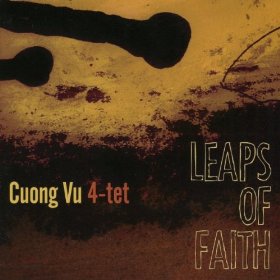 Cuong Vu 4-tet - "Leaps of Faith"
Cuong Vu 4-tet - "Leaps of Faith"
(Origin Records)
Trumpeter Cuong Vu has never been shy about taking on challenges and obliterating boundaries. His new 4-tet configuration this time features two electric bassists - Stormu Takeishi and Luke Bergman (in place of Chris Speed or Bill Frisell), along with drummer Ted Poor. If you think this unusual assemblage may result in some unexpected sounds, you would quite correct. Bergman was a student of Vu and a central part of last year's powerful Speak album with his mentor. On this album, Vu and his group take on three standards :"Body and Soul," "All the Things You Are" and "My Funny Valentine;" George Harrison's "Something" and Jackson Brown's "My Opening Farewell;" plus three Vu-penned originals - including the "Giant Steps"-inspired title track. But don't expect to hear too much recognizable influence from those familiar tunes. Wobbling, wavering sounds, strange electronic effects and Vu's floating trumpet make for an dark and shadowy alien atmosphere. It may be quite a bit different from your grandfather's jazz, but that doesn't mean it isn't an interesting ride. The cycle of fifth-based chord progression on "All the Things You Are" emerges from a barrage of sounds and bombastic drumming from Poor, while Vu plays the melody pretty straight on "My Funny Valentine" - while the rest of the band creates a soundtrack from hell beneath it. The title track is an exhilarating, in-your-face fun house ride close to being heavy metal noise rock, while "Child-Like (For Vina)" is an experimental epic-length slow blues that reminds one of amped-up "Tribute to Joe Johnson"-era Miles. The George Harrison number is slowed to a crawl with the satisfying result of bringing the bittersweet nature of the song to the forefront. "I Shall Never Come Back" is an even longer (15:09) live recorded piece with a heavy rock drum backbeat under the main theme a free form middle section and tons of industrial noise. Tha Vu is rock-oriented is no surprise as he has worked with many artists in that genre as well, including David Bowie and Laurie Anderson. The Jackson Brown number is another bend toward rock, with Vu staying fairly true to the pop melody and his bandmates bashing things around in what is the calm (and storm) after the storm that ends this intriguing recording.
http://www.origin-records.com/
Majid Khaliq - "The Basilisk" 
The violin has always held a tenuous place in the world of jazz, despite the presence of people like Ray Nance and Stuff Smith. From Stephane Grappelli and the gypsy jazz world to the jazz fusion of Jean-Luc Ponty, to chamber jazz or folk music (see Bill Frisell's latest) to avant garde of people like Billy Bang, the instrument seems only to exist on the periphery of the genre. Recently, Regina Carter and Christian Howes have made inroads, but the instrument still seems to be primarily considered a novelty in the jazz genre. Now young Majid Khaliq throws his bow ionto the ring with a debut release that combines jazz, classical and even hip-hop influences in a serious bid to make the violin an important voice in modern jazz. The title track lives up to its title (the legendary and deadly mythical lizard) with a winding, hard edged chart brought to life by Khaliq and his outstanding band that features some of the hottest young talent on the NYC scene. These firebrands include drummer Johnathan Blake, trumpeter Charlie Porter, pianists Jeb Patton and Eric Lewis, along with Chicago-born bassist Ivan Taylor. Although Khaliq takes the majority of solos, he is wise to turn his fellow players loose and they respond with energy and skill. Porter, Lewis and Taylor are the violinist's main foils on the superb opening track - that includes some hip-hop rhythms as well, but things heat up even more on "Expectation" with Lewis' incendiary piano solo and Blake threatening to melt his drum kit from the heat generated on this burning burner. Not to say Khaliq is overshadowed - his solos are efforts of the remarkable creativity that brought the young man to the attention and acclaim of no less than Wynton Marsalis. Feeling a need to slow it down after two frantic pieces, "O-Home" starts as a stately cut-time chamber music piece before mutating into a lovely jazz waltz with elegant Grappelli-esque violin dancing over Patton's sparkling keys. Khaliq's strength as a composer continues with "Mansa Khan Musa" is a subtle mid-tempo number that is escalated by Lewis' unexpected piano innovations, and the somewhat avant garde-leaning "Spirals" (with a swinging mid-section and uncredited guitar). The young man also pays tribute to one his heroes by covering McCoy Tyner's breakneck-paced "Inner Glimpse" - a track that really highlights the youthful energy of these fine players. Cole Porter's unfamiliar "The Truth" and the Burke/Van Husen chestnut "Polka Dots and Moonbeams" slow things down beautifully, and end the album in a lusciously compelling manner. A promising debut from a young artist we should be hearing more from in the future.
http://www.majidhaliq.com/
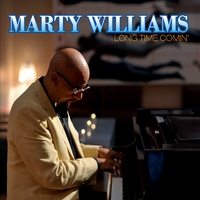 Marty Williams - "Long Time Comin' "
Marty Williams - "Long Time Comin' "
(In Moon Bay)
Former Milwaukean Marty Williams is a fixture on the San Francisco Bay area jazz scene as a pianist, singer and entertainer. His performances have been described as a mixture of "Oscar Brown, Jr., Mose Allison, Monk and Redd Foxx" (?!) I don't know about the latter - I don't think I detected any blue language on this album (maybe he went family friendly on record?), but the other elements are certainly there. Williams' smooth, yet gravelly and well-worn, easy going, yet lively delivery is a treat, and he tickles the ivories pretty nicely too. The song list itself indicates an active and curious mind, with songs including Beatles' "Come Together," Cole Porter's "Love for Sale," "Caravan," "Monk's Dream," "Mercy, Mercy, Mercy," "Sunny," "The Look of Love" and the always enjoyable Eugene McDaniels-written rave up "Compared to What" ( a hit for Les McCann). The singer/pianist is backed by guitarist Eric Swinderman - who proves a nice counterpart with an attractive bluesy feel (immediately apparent on the heartfelt opening Oscar Brown Jr. classic "Brother (Where Are You)"), intuitive drummer Ranzel Merritt and warm-toned bassists Ruth Davies and Jon Evans. Throughout this enjoyable set of R&B-flavored jazz, William's joyous personality shines through on these tracks, and I'd bet my bottom dollar he's a hoot in concert. This album is a lot of fun and the next best thing to catching him live.
www.martywilliamsmusic.com
Bones & Tones - "Bones & Tones"
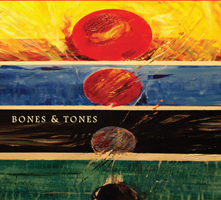 (Freedom Arts Records)
(Freedom Arts Records)
When marimba player/percussionist/composer Lloyd Haber was asked to put together a group for the 2009 Long Beach Jazz Festival, he came up with a novel idea. He recruited vibraphonist/percussionist/ composer Warren Smith, to be the other lead voice in a quartet that also features percussionist/vocalist/ kora playert Abdou Mboup and bassist Jaribu Shahid. The result was so succesful that the band went into the studio and recorded this novel album. Although there is considerable world music and African influence, there is also a strong current of jazz running through the songs. The four members extensive background contribute to the proceedings: Haber was a student of the late Ed Blackwell and has worked with Ornette Coleman and Don Cherry; Smith was a founding member of Max Roach's M'Boom drum collective; the Senegalese-born Mboup is famous as a griot, percussion master and kora player and has worked with Jean-Luc Ponty, Talking Heads and Joe Zawinul; Shahid, meanwhile has played with Motown artists martha Reeves and the Spinners, as well as Sun Ra, Milt Jackson, Henry Threadgill, David Murray and as a longtime member of Roscoe Mitchell's Note Factory. Many of these influences are brought to bear here. Haber and Mboup cowrote "Breathing Water" - a very African sounding piece and Mboup's vocals are a treat. Smith's "228" veers more into a jazz feel, while Haber's "Dance for Suwoo" has a Carribean island breeze to it. Shahid's creative rhythmic patterns lock in with the drums to provide the bedrock over which Smith and Haber overlay their lines. "Configuration" is an uptempo and danceable Haber composition, while his "Song for the Old Ones" brings in bells and exotic sounds, but balances the African element with jazz nicely, while "Carajillo Con Mantilla" has a Latin or Brazilian flavor. "MR7"'s funky groove leads into the album-concluding "In the Valley of Dreams" on which Mboup's kora and vocalese get the spotlight on a dancing trip across the savanna. Fans of percussion will love this album and jazz fans may be surprised when they find they don't even notice the absence of guitar, piano or horns.
http://www.freedomartrecords.com/
